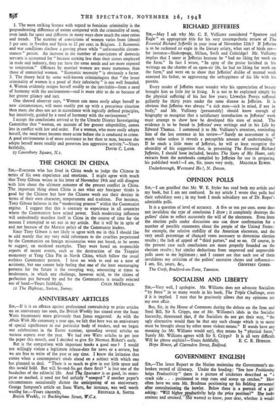RICHARD JEFFERIES
SIR,—May I ask why Mr. C. E. Vulliamy considered "Sparrow and Eagle" an appropriate title for his very unsympathetic review of The Essential Richard lefierlis in your issue of November 12th? If Jefferies is to be reckoned an eagle in the literary aviary, what sort of birds are— for instance—Shakespeare, Milton, Swift and Coleridge? Mr. Vulliamy implies that I sneer at Jefferies because he "had no liking for work on the farm." In fact I wrote, "In spite of the praise lavished in his writings on the charms of an open-air life, he had no liking for work on the farm," and went on to show that Jefferies' dislike of manual work annoyed his father, so aggravating the unhappiness of his life with his parents.
Every reader of Jefferies must wonder why his appreciation of beauty brought him so little joy in living. It is not to be explained simply by the physical suffering of his last few years; Llewelyn Powys suffered gallantly for thirty years under the same disease as Jefferies. It is obvious that Jefferies was always "a sick man—sick in mind, if not in body," and Mr. Vulliamy (presumably) should know enough of biography to recognise that a satisfactory introduction to Jefferies' work must attempt to show how he developed this state of mind. The evidence is to be found in Jefferies' own writings and in his Life by Edward Thomas. I commend it to Mr. Vulliamy's attention, reminding him of the last sentence in his review—" Surely no assessment is of much value unless it reveals a perceptible amount of understanding." If he reads a little more of Jefferies, he will at least recognise the absurdity of his suggestion that, in presenting The Essential Richard lefferies, I should have included, besides The Story of My Heart, only extracts from the notebooks compiled by Jefferies for use in preparing his published work! —I am, Sir, yours very truly, MALCOLM ELWIN.
Underborough, Westward Ho !, N. Devon.




































 Previous page
Previous page